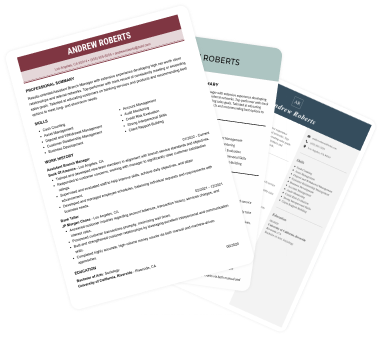Create a professional CV now!
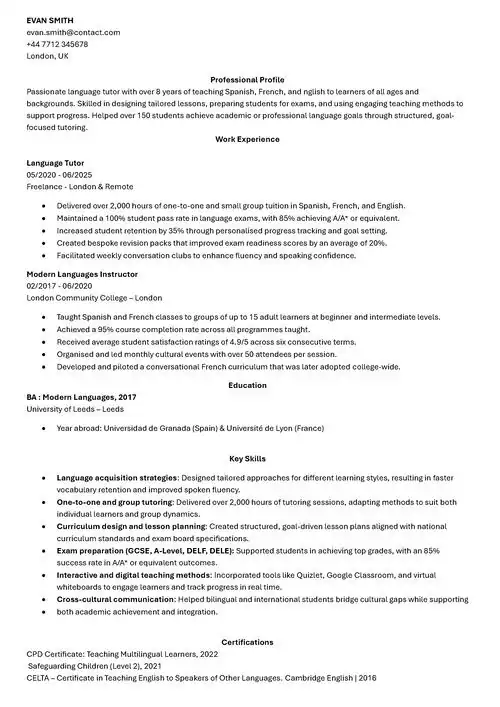 NO
NO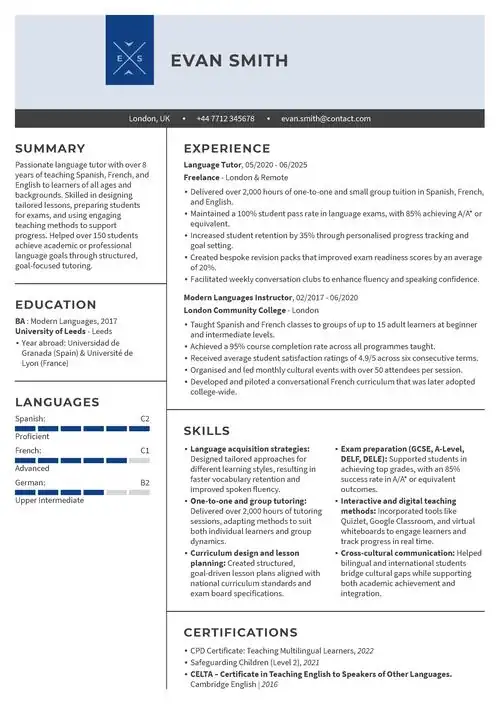 YES
YESLast updated on 29 December, 2025
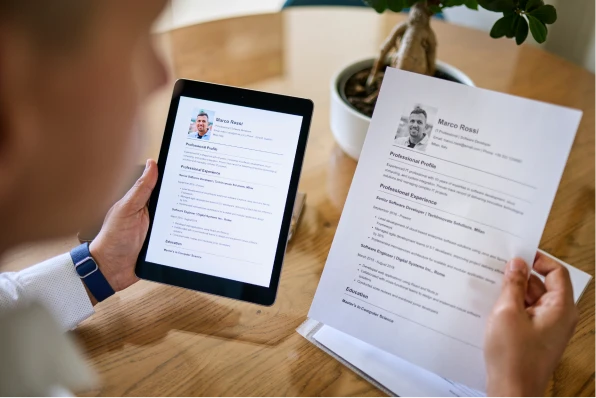
Language skills on a CV can open doors to exciting opportunities. Whether you're multilingual or just beginning to learn a new language, showing your proficiency can set you apart from other candidates.
In this guide, I’ll walk you through the best ways to describe language levels on your CV, explain different frameworks like CEFR and IELTS, and share practical examples to help you stand out.
Create an effective CV in minutes. Choose a professional CV template and fill in every section of your CV in a flash using ready-made content and expert tips.
Create a professional CV now!
 NO
NO YES
YESWe created the sample on the left using our builder. See other good CV examples like this one.
Languages are strategically vital for the future of the UK. With an increasing number of British companies expanding abroad or serving multicultural communities, there’s a growing need for professionals who can bridge language gaps.
Hiring managers often look for candidates who can work with international clients, support diverse teams, or communicate across borders. That’s especially true in sectors like customer service, sales, marketing, logistics, and education.
If you have language skills, you should include them on your CV, even if the job doesn't specifically ask for them. Speaking another language can give you an edge even in non-international jobs. It shows valuable CV skills like initiative, a willingness to learn, and the ability to think beyond your environment.
See our CV examples for jobs that benefit from showcasing CV language levels:
Employers want to know how well you can communicate, and ideally, they want to see your ability described using recognised terms or frameworks.
What they don’t want to see are vague descriptions such as “Knows some Spanish” or “Great at French”. Let’s walk through the four most common ways to express language proficiency on an English CV.
If you’re keeping things simple, it’s fine to use clear, universally understood terms such as:
These terms are easy to understand, but are not an official framework. Using them indicates you’ve never taken an official test to determine your language skill level. They aren’t inherently bad, but a perfect CV would showcase language skills backed up with formal credentials.
The Common European Framework of Reference for Languages (CEFR) is widely used across the UK and Europe, and is the standard in a Europass CV. It breaks down language ability into six levels, from A1 (beginner) to C2 (near-native fluency):
These levels can be gained by taking a Cambridge English Qualifications exam at the corresponding level. Most employers and academic institutions recognise CEFR, and these certifications do not expire, so they are a lifetime investment.
If you’ve taken the IELTS (International English Language Testing System) test, you can use your score to indicate English proficiency. IELTS score is often required for a UK visa or academic purposes. IELTS is scored from Band 1 to Band 9:
It’s worth noting that many UK universities and employers require a minimum of 6.5 to 7.0 for admission or professional roles. IELTS certifications also have an expiration date. They are valid for 2 years from the date of the test.
If you studied a language at school, you can reference your GCSE or A-Level qualifications:
This is especially useful in school leaver CVs or for early-career applicants without workplace/certification evidence of language use. Just keep in mind that GCSEs aren’t a perfect equivalent to CEFR or IELTS, and are more comparable to standard CV language level terms.
You can also add GCSE scores to your CV education section. This way, you’ll be able to provide some additional context for specific grades.
|
Standard descriptors |
CEFR |
IELTS |
GCSE equivalent |
|
Native/Bilingual |
C2 |
Band 9 |
Not applicable |
|
Fluent |
C1 |
Band 7–8 |
A-Level A (9) |
|
Proficient |
B2 |
Band 6–7 |
GCSE A / B (7–8) |
|
Intermediate |
B1 |
Band 5–6 |
GCSE B / C or equivalent (6–5) |
|
Basic |
A1/A2 |
Below band 5 |
GCSE below C or short course (Below 5) |
A strong CV summary will convince the recruiter you’re the perfect candidate. Save time and choose a ready-made personal statement written by career experts and adjust it to your needs in the LiveCareer CV builder.
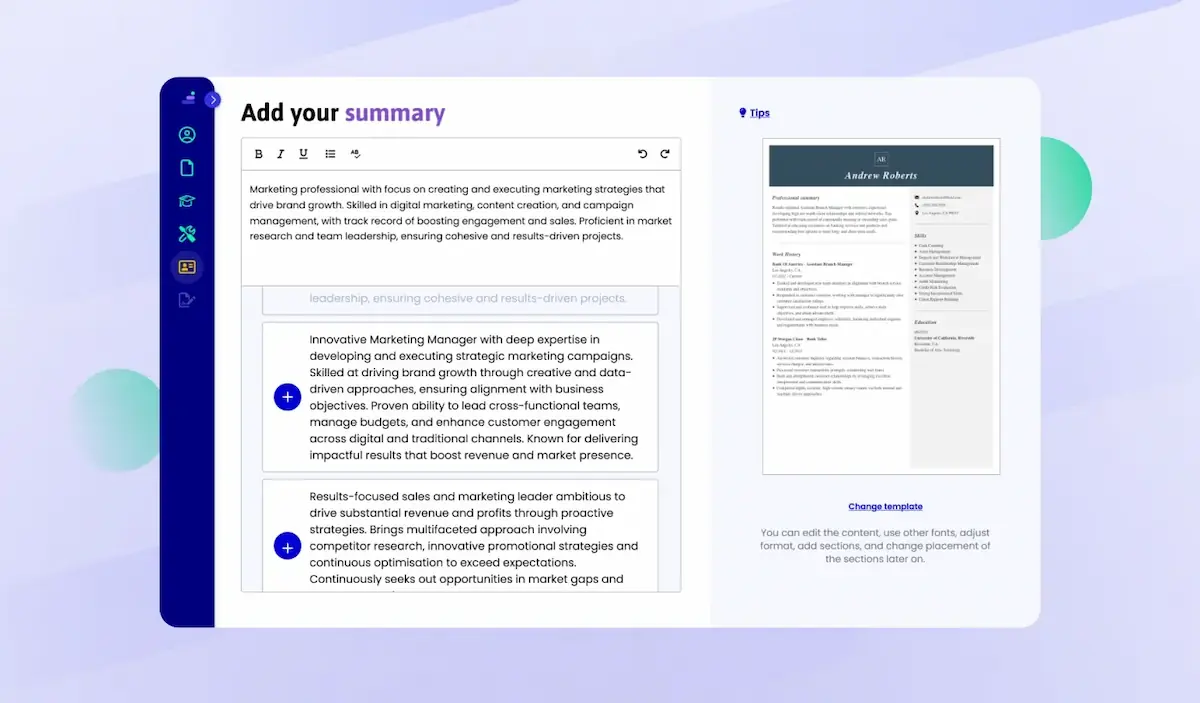
Not sure how fluent you are in a language? You’re not alone. If you can’t take an exam to tell you exactly what your level is, the only option left is to self-assess. Here is how to approach it to be as accurate as possible:
Once you've assessed your language skills, the next step is to include them on your CV. Where you place this information depends on how important language is for the role you're applying for.
Let’s look at two effective ways to include language proficiency in your CV:
If languages are a key selling point for the job, such as in roles related to translation, international business, customer service, or global logistics, mentioning them in your CV profile (the short paragraph at the top of your CV) can immediately grab attention.
This is especially useful when a specific language is central to the job description. This likely makes it a CV keyword, and you need to include it if you want your CV to pass Applicant Tracking Systems.
Here are some examples:
CV profile with language skills—example #1
Customer-focused professional with 6+ years of experience in international retail. Fluent in Spanish (C1) and English (native), ready to support diverse client bases and resolve service issues across cross-border markets. Successfully improved customer satisfaction scores by 18% by introducing bilingual support for Spanish-speaking clients.
CV profile with language skills—example #2
Multilingual communications graduate fluent in French (C2) and German (B2), with hands-on experience translating technical documents for global NGOs. Increased translation efficiency by 25% by implementing a glossary-based consistency system for high-volume projects across three departments.
CV profile with language skills—example #3
Detail-oriented logistics coordinator with working proficiency in Polish (B2) and Romanian (B1). Managed multilingual supply chain documentation and liaised with vendors across Eastern Europe. Reduced customs clearance delays by 30% through streamlined bilingual communication with Eastern European suppliers.
If your language skills aren’t central to the role but still valuable, place them in a dedicated languages section, typically toward the bottom of your CV, either just after the skills or education section.
Decide on one method you’re going to use throughout. Don’t mix the frameworks as it looks disorganised and may confuse the reader. See the examples below:
CV language section—example #1
CV language section—example #2
CV language section—example #3
You don’t have to be a CV writing expert. In the LiveCareer CV builder you’ll find ready-made content for every industry and position, which you can then add with a single click.

Applying the tips from this article will help you describe your language levels on a CV clearly and easily. Thank you for reading, and good luck with your career pursuits!
Our editorial team has reviewed this article for compliance with Livecareer’s editorial guidelines. It’s to ensure that our expert advice and recommendations are consistent across all our career guides and align with current CV and cover letter writing standards and trends. We’re trusted by over 10 million job seekers, supporting them on their way to finding their dream job. Each article is preceded by research and scrutiny to ensure our content responds to current market trends and demand.
Category: CV Help
Crafting a job-winning CV is all about showcasing your unique skills and experiences. Start with a strong personal statement that highlights your career goals and achievements.
Try Our CV Builder Now